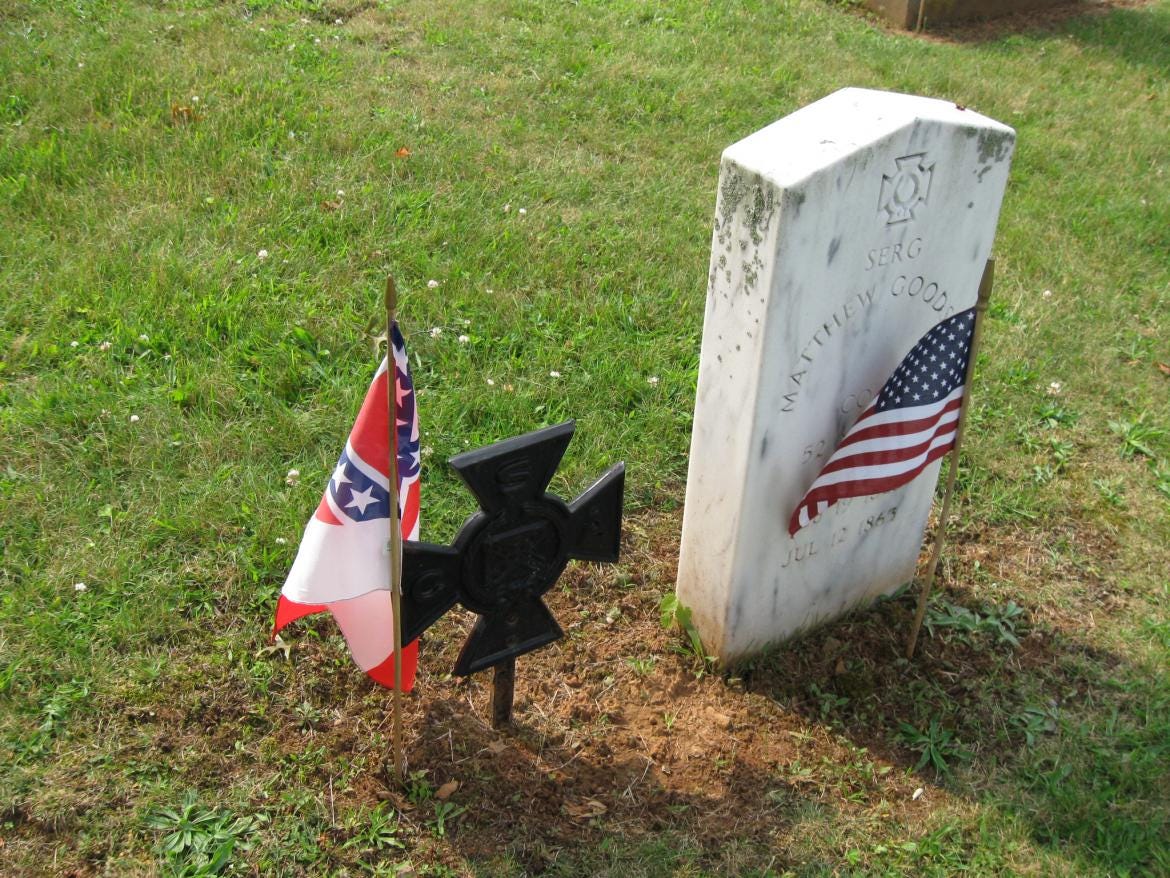This post was originally posted on PoliticsNC.com on Memorial Day, 2015.
Memorial Day has come to represent the unofficial beginning of summer, even if the solstice is still more than three weeks away. Shop owners and rental agents can finally begin to refill coffers that have been dwindling since Labor Day. And Southern clothes hounds can declare that it’s finally okay to breakout the seersucker.
However, Memorial Day is not so much a holiday as a somber day of remembrance and respect for those who lost their lives in our nation’s wars. It started as a day to honor those killed in the Civil War. After World War I, it became a day to remember the dead from every conflict.
As far as I know, my only direct ancestor to die in battle was Sergeant Matthew Goodson, who died of wounds he sustained during Pickett’s Charge at Gettysburg. He was my great-great-grandfather and he left behind a daughter, my great-grandmother, who was only eight months old when he died. He’s one of only two Confederate soldiers with markers in Evergreen Cemetery in Gettysburg.
Growing up, I was proud of my Confederate heritage. I owned beach towels that bore the Confederate battle flag. I had a coaster with a caricature of a white-bearded Confederate veteran with the words “Hell no, I ain’t fergettin’ ” and, for awhile, I wore a hat that read, “Keep the South beautiful. Put a yankee on a bus.” I bought into the Southern myth of honor, valor, and the Lost Cause.
At the same time, among my earliest memories is the assassination of Dr. Martin Luther King, Jr. I remember it as a major tragedy and believed him to be a martyr and a hero. I knew that segregation was wrong and was proud to have friends both black and white. I believed that racism was a plague on our country that especially infected the South.
Over time, I realized how hurtful the symbols of the old Confederacy must be to African-Americans. Public displays of the Confederate flag are often accompanied by the phrase “Heritage not hate,” but in the eyes of African-Americans, the battle flag must be somewhat akin to what swastikas are to Jews. It’s time we white Southerners come to terms with our past and begin to reconcile some of our contradictions.
Revisionists like to claim that the War was about states’ rights more than slavery. But even if that were true, the war would be no less unjust. Our country was founded on high-minded ideals. “We hold these truths to be self-evident,” Jefferson wrote, “that all men are created equal, that they are endowed by their Creator with certain unalienable Rights, that among these are Life, Liberty, and the pursuit of Happiness.” It’s those human principles that we should defend--the ones denied slaves--instead of constructs of government like states’ rights.
In the wake of their defeat, white Southerners created the myth of the Lost Cause to convince themselves that their boys did not die in vain, but for something noble. In doing so, they denied or ignored the inhumanity of slavery and extended the systemic brutality of black Southerners for another hundred years. Unlike post-war Germany, which faced its sins, took responsibility, and rebuilt its society and economy, the South is still struggling to come to terms with its defeat and its culpability 150 years after the end of the Civil War.
The Lost Cause was not an honorable mission, but a futile defense of a feudalistic economic and social system that sacrificed the lives of hundreds of thousands of young men. Slavery, and then Jim Crow, were kept in place by brutality that rivals that of the Islamic State today. Sexual violence, torture, and murder, tacitly sanctioned by religious authorities, kept a large segment of the population submissive and traumatized. That’s nothing to celebrate or honor.
So today, let’s remember the men and women who gave their lives to protect our freedom and our liberty, the principles and ideals on which this country is founded. They deserve our recognition and deep appreciation.
But let’s not forget men like Matthew Goodson, either. His loss offers us a lesson. His death was a senseless tragedy that left his daughter to grow up never knowing her father. Such a sacrifice might have been warranted to protect her freedom and liberty, but it was a waste in defense of the inhumanity of slavery. So if ever again, our government calls on us to take up arms in defense of discrimination and injustice, our answer should be, quite clearly, “No.”





I agree 100% Thomas
Thanks for the thoughtful essay.